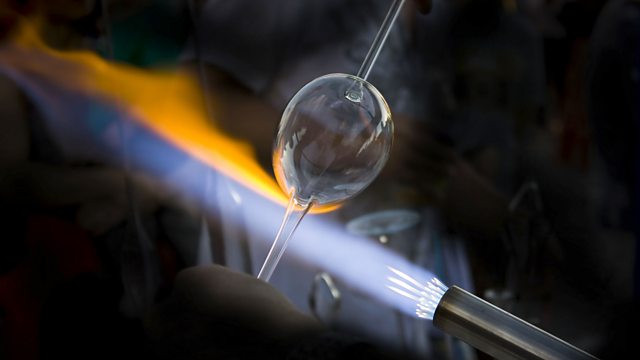The Science of Glass
Melvyn Bragg and guests discuss the puzzling science of glass which, though hard and brittle, retains aspects of a liquid once cooled into its solid form.
While glass items have been made for at least 5,000 years, scientists are yet to explain, conclusively, what happens when the substance it's made from moves from a molten state to its hard, transparent phase. It is said to be one of the great unsolved problems in physics. While apparently solid, the glass retains certain properties of a liquid. At times, ways of making glass have been highly confidential; in Venice in the Middle Ages, disclosure of manufacturing techniques was a capital offence. Despite the complexity and mystery of the science of glass, glass technology has continued to advance from sheet glass to crystal glass, optical glass and prisms, to float glasses, chemical glassware, fibre optics and metal glasses.
With:
Dame Athene Donald
Professor of Experimental Physics at the University of Cambridge and Master of Churchill College, Cambridge
Jim Bennett
Former Director of the Museum of the History of Science at the University of Oxford and Keeper Emeritus at the Science Museum
Paul McMillan
Professor of Chemistry at University College London
Producer: Simon Tillotson.
Last on
LINKS AND FURTHER READING
听
READING LIST:
Robert H. Doremus, Glass Science (first published 1973; Wiley-Interscience, 1994)
R. W. Douglas and Susan Frank, A History of Glassmaking (G T Foulis & Co Ltd, 1972)
J. E. Gordon, New Science of Strong Materials: Or Why You Don't Fall Through the Floor (Pitman Publishing, 1979)
George W. Morey, The Properties of Glass (Reinhold Publishing Corp, 1954)
Alan Macfarlane and Gerry Martin, The Glass Bathyscaphe: How Glass Changed the World (Profile Books, 2002)
F. J. Terence Maloney, Glass in the Modern World (Aldus Books, 1967)
P. W. McMillan, Glass-Ceramics (Non-Metallic Solids: Volume 1) (Academic Press Inc, 1979)
Mark Miodownik, Stuff Matters: The Strange Stories of the Marvellous Materials that Shape Our Man-made World (Penguin, 2014)
H. Rawson, Inorganic Glass-Forming Systems (Academic Press, 1967)
Stephen L. Sass, The Substance of Civilization: Materials and Human History from the Stone Age to the Age of Silicon (Arcade Publishing, 1998
听
Credits
| Role | Contributor |
|---|---|
| Presenter | Melvyn Bragg |
| Interviewed Guest | Athene Donald |
| Interviewed Guest | Jim Bennett |
| Interviewed Guest | Paul McMillan |
| Producer | Simon Tillotson |
Broadcasts
- Thu 28 May 2015 09:00麻豆社 Radio 4
- Thu 28 May 2015 21:30麻豆社 Radio 4
Featured in...
![]()
20th Century—In Our Time
Browse the 20th Century era within the In Our Time archive.
![]()
Science—In Our Time
Scientific principles, theory, and the role of key figures in the advancement of science.
![]()
In Our Time: Science - Top 10—In Our Time
The top ten programmes to listen to from In Our Time's Science archive.
In Our Time podcasts
Download programmes from the huge In Our Time archive.
The In Our Time Listeners' Top 10
If you鈥檙e new to In Our Time, this is a good place to start.
Arts and Ideas podcast
Download the best of Radio 3's Free Thinking programme.
Podcast
-
![]()
In Our Time
Melvyn Bragg and guests discuss the ideas, people and events that have shaped our world.



